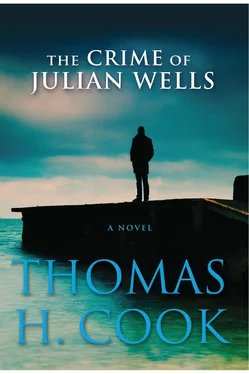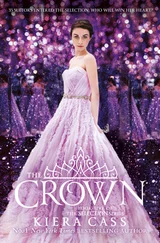Thomas Cook - The Crime of Julian Wells
Здесь есть возможность читать онлайн «Thomas Cook - The Crime of Julian Wells» весь текст электронной книги совершенно бесплатно (целиком полную версию без сокращений). В некоторых случаях можно слушать аудио, скачать через торрент в формате fb2 и присутствует краткое содержание. Год выпуска: 2012, ISBN: 2012, Издательство: Grove Press, Жанр: Криминальный детектив, на английском языке. Описание произведения, (предисловие) а так же отзывы посетителей доступны на портале библиотеки ЛибКат.
- Название:The Crime of Julian Wells
- Автор:
- Издательство:Grove Press
- Жанр:
- Год:2012
- ISBN:9780802194589
- Рейтинг книги:5 / 5. Голосов: 1
-
Избранное:Добавить в избранное
- Отзывы:
-
Ваша оценка:
- 100
- 1
- 2
- 3
- 4
- 5
The Crime of Julian Wells: краткое содержание, описание и аннотация
Предлагаем к чтению аннотацию, описание, краткое содержание или предисловие (зависит от того, что написал сам автор книги «The Crime of Julian Wells»). Если вы не нашли необходимую информацию о книге — напишите в комментариях, мы постараемся отыскать её.
The Crime of Julian Wells — читать онлайн бесплатно полную книгу (весь текст) целиком
Ниже представлен текст книги, разбитый по страницам. Система сохранения места последней прочитанной страницы, позволяет с удобством читать онлайн бесплатно книгу «The Crime of Julian Wells», без необходимости каждый раз заново искать на чём Вы остановились. Поставьте закладку, и сможете в любой момент перейти на страницу, на которой закончили чтение.
Интервал:
Закладка:
“Yes,” I said.
For the first time, I felt a turn in the narrative I’d been living through.
It was clear that Loretta had noticed a dark undertow in my answer.
“Do you think Julian ever knew any of this?” she asked.
“I don’t know,” I answered.
For a moment I felt that we were both fixed in a space no one else could share.
“Philip, are you still there?” Loretta asked.
Her tone was troubled, and I realized that I’d been silent for a long time, and the silence alarmed her.
“Yes,” I said.
There was a brief pause, then Loretta said, “Would you mind if I joined you, Philip? Could you use a traveling companion?”
It struck me that Julian had never had such a companion, and that perhaps this, too, had served to doom him.
Might it doom me, too?
With that question I felt myself curiously imperiled, like a man moving down a river, into a darkness, now afraid that at the end of the journey there might be revelations as fatal to me as they had been for Julian, terrors that he had faced in solitude and isolation but that I had not the courage to face alone.
“Yes,” I said, like a man reaching for a life rope. “Yes, I could.”
She arrived in Budapest a week later, dressed in a dark red blouse and floral skirt, glancing swiftly here and there, until she saw me in the waiting crowd.
“Welcome,” I said when she came over to me, and meant it.
Even so, she looked at me doubtfully. “Really, Philip?”
“Yes, really,” I assured her. “As you guessed, I could use some company.”
“But you’ve always seemed quite self-contained.”
“We’re not always how we seem,” I said.
“Almost never, in fact,” Loretta said.
Something in her gaze took hold of me so that I felt exactly as Charles feels when he sees Emma Bovary, how dark her eyes are and how marked with fearless candor.
The intense feeling that swept over me at that moment had to be diverted, so I nodded toward where I had a car waiting.
On the drive into the city, Loretta kept her eyes keenly fixed on the new surroundings. In that keenness, that hunger for things she had not seen before, I glimpsed the young girl she had once been, the one who had traveled with Julian, two brilliant children facing their father’s camera as they stood at the bottom of the Spanish Steps or at the Eiffel Tower, pictures she’d framed and hung in the Montauk house. There’d been other pictures, too, those same children walking through the butterfly house in Salzburg or along the shaded trails of the Vienna Woods. They had also strolled Barcelona’s Ramblas together and paused to marvel at Sagrada Familia.
In each photograph, they appeared splendidly happy, children endowed with as much good fortune as anyone could wish.
Those two bright young faces had changed quite a bit over the years, but it was Julian’s that changed the most, and at our last meeting I’d gotten the feeling that it was not just exhaustion that plagued him but some tumorous mental growth that had at last broken through the surface.
When I said this to Loretta, she considered it a moment, then said, “You know, he said something quite disturbing a couple of days before he went out in the boat. He was sitting by the pond. I went out to him. He had that look in his eye, like he was deep in thought. Just as a matter of conversation I said, ‘So, how are you doing, Julian?’ I expected him to answer the way he usually did, something like, ‘I’m fine, Loretta, how are you?’ But instead he quoted that line from The Rime of the Ancient Mariner. You know, the one where he says, ‘A thousand slimy things lived on and so did I.’ I took it for a little joke and made nothing of it. Julian often said things like that. Self-deprecating things. But this time, I should have known that he was in a very bad place.”
“We let a lot go by, didn’t we?” I asked. “There were signs we didn’t read.”
She nodded. “Yes, there were.”
When we reached the hotel, Loretta stepped out of the car and looked at its ornate facade. I could see that she recognized it.
“Julian mentioned this hotel,” she said. “I remember it from his letters. ‘It has beautiful Zsolnay tiles,’ he said.”
“They’re in the bathhouse,” I told her. “In the old days, it was used by the Soviets. It’s where they met their agents. Or at least that’s what the hotel manager told me. In any event, it gives the place some history.”
Seconds later we were in the lobby. I nodded toward the bar. “Maybe a drink before you go up?”
“Yes, that would be nice.”
We were soon seated at a small table in the bar, drinks in hand, Loretta casting her eyes about the room with what still seemed like a hint of childlike wonder.
“Very dark here,” she said. “Thick curtains.”
“It looks like a place where ‘certain documents’ might have been exchanged,” I said, rather as a joke.
“Julian described it in one of his letters,” Loretta said. “He said that it looked like an old man still concealing his crime.” She took a sip of her drink. “Do you think he came upon this hotel by accident?”
I shrugged. “I suspect the bullet holes near the door and around the first-floor windows might have gotten his attention,” I answered. “The manager here speaks English quite well, so I’ve listened to his history of the place. I asked him about the bullet holes. They’re from when the Arrow Cross-the Hungarian fascist party that collaborated with the Nazis-defended the city against the Russians. The Germans had abandoned it by then.”
Loretta reached into her bag and retrieved a single photograph. “I thought you might want to see this,” she said as she handed it to me.
In the photograph, Julian is seated at the little office alcove on the second floor of the Montauk house, a large window behind him, the pond shimmering in the background. He is holding a book whose title I can’t make out, but which seems as battered as the man holding it. His hair is slightly mussed, as it often was in the morning, and he is wearing the blue robe I gave him as a welcome-home gift upon his return from Russia.
“Why this picture?” I asked.
“I thought of it after I talked to you,” Loretta said. “It’s the last picture of Julian. He set up the camera and took it himself.”
“It’s an odd self-portrait,” I said. “Not very flattering.”
“I didn’t know he’d taken it,” Loretta said. “But when I started to put the camera away, I noticed it and printed it out.” She drew the picture from me and looked at it very intently. “It’s a warning, a picture like that: ‘Don’t end up like me.’” She handed the photograph back to me, then looked toward the window, out at the busy street life. “I’ve often thought that if life were fair, we’d be given a picture of where we’ll end up if we continue down the road we’re on.” She turned, and the smile she offered quickly faded. “That might be enough to save us.”
For a time, she was silent, then she said, “So, what’s your theory about Julian at the moment, Philip?”
“I don’t have one,” I admitted.
“I don’t either,” Loretta said. “I simply think Julian was a condemned man, a man who was sentenced to some sort of inner life imprisonment.”
“But for what crime?” I asked.
“That would be the question, wouldn’t it?” Loretta asked. She took another sip from her drink. “The crime of Julian Wells,” she added. “Still unsolved.” She seemed suddenly to shuffle off the weariness of her long flight, perhaps even some part of the long aridity that had marked her life since Colin’s death. “So,” she said, “where do we begin?”
21
Интервал:
Закладка:
Похожие книги на «The Crime of Julian Wells»
Представляем Вашему вниманию похожие книги на «The Crime of Julian Wells» списком для выбора. Мы отобрали схожую по названию и смыслу литературу в надежде предоставить читателям больше вариантов отыскать новые, интересные, ещё непрочитанные произведения.
Обсуждение, отзывы о книге «The Crime of Julian Wells» и просто собственные мнения читателей. Оставьте ваши комментарии, напишите, что Вы думаете о произведении, его смысле или главных героях. Укажите что конкретно понравилось, а что нет, и почему Вы так считаете.












